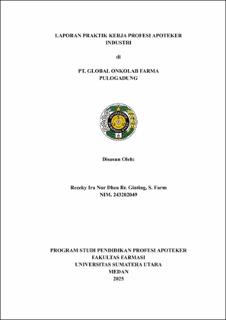| dc.description.abstract | Background: The pharmaceutical industry is a legal entity authorized to carry out activities related to the production or utilization of production resources, distribution of drugs, raw materials, and phytopharmaceuticals, as well as education and training, research, and development. Pharmacists hold a crucial role in the pharmaceutical industry. They must possess adequate qualifications, knowledge, experience, and skills to ensure the proper implementation of Good Manufacturing Practice (GMP) in accordance with established standards.
Objective: The Pharmacist Professional Practice is conducted with the aim of enabling prospective pharmacists to understand the importance of implementing Good Manufacturing Practice (GMP) in biopharmaceutical production to guarantee product quality, safety, and efficacy in compliance with regulatory requirements and international
quality standards.
Summary: Good Manufacturing Practice (GMP) consists of principles applied to maintain the quality and integrity of pharmaceutical preparations. GMP ensures that the products manufactured by the pharmaceutical industry meet the requirements of safety, efficacy, and quality. In general, GMP guidelines cover the pharmaceutical quality system, personnel, buildings and facilities, equipment, production,
proper storage and distribution, quality control, self-inspection, complaints and product recalls, documentation, outsourcing activities, as well as qualification and validation.
Conclusion: GMP is a fundamental guideline to maintain the safety, efficacy, and quality of pharmaceutical products. Its implementation relies on competent pharmacists, and through professional practice, future pharmacists are expected to apply GMP effectively to ensure biopharmaceutical product quality. | en_US |


